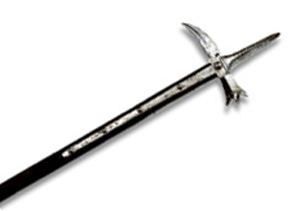Bec
de Corbin
(Crowbill)

Bec
de Corbin
(Crowbill)

| Weapon Type | Approximate
Weight in Pounds |
Size S or M | Size L | Notes | Length | Space Required | Speed Factor | 0 | 1 | 2 | 3 | 4 | 5 | 6 | 7 | 8 | 9 | 10 |
| Bec de Corbin | 10 | 1-8 | 1-6 | - | c. 6' | 6' | 9 | +2 | +2 | +2 | +2 | +2 | 0 | 0 | 0 | 0 | 0 | -1 |
At first glance, a bec de corbin might be mistaken for a Lucern
hammer, but important functional differences can be noted.
The bec de corbin was used late in the Middle Ages and into the Renaissance
by knights and nobles, not by commoners.
Its heavy, crow’s-beak blade was designed to puncture the heavy plate
armor common to upperclass warriors. In this weapon the beak is the major
feature.
This is backed by a flat hammer head, or by a clawed head somewhat
similar to that of a Lucern hammer,
and the end spike is more bladelike and far shorter than the awl spike
of the Lucern hammer, for the latter weapon was not so specialized.
|
|
|
|
|
|
*template***template*